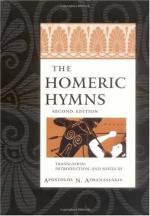Till the end of the present century, mythologists did not usually employ the method of comparing Greek rites and legends with, first, the sympathetic magic and the fables of peasant folk-lore; second, with the Mysteries and myths of contemporary savage races, of which European folk-lore is mainly a survival. For a study of Demeter from these sides (a study still too much neglected in Germany) readers may consult Mannhardt’s works, Mr. Frazer’s “Golden Bough,” and the present translator’s “Custom and Myth,” and “Myth, Ritual, and Religion.” Mr. Frazer, especially, has enabled the English reader to understand the savage and rural element of sympathetic magic as a factor in the Demeter myth. Meanwhile Mr. Pater has dealt with the higher sentiment, the more religious aspect, of the myth and the rites. I am not inclined to go all lengths with Mr. Frazer’s ingenious and learned system, as will be seen, while regretting that the new edition of his “Golden Bough” is not yet accessible.
If we accept (which I do not entirely) Mr. Frazer’s theory of the origin of the Demeter myth, there is no finer example of the Greek power of transforming into beauty the superstitions of Barbarism. The explanation to which I refer is contained in Mr. J. G. Frazer’s learned and ingenious work, “The Golden Bough.” While mythologists of the schools of Mr. Max Muller and Kuhn have usually resolved most Gods and heroes into Sun, Sky, Dawn, Twilight; or, again, into elemental powers of Thunder, Tempest, Lightning, and Night, Mr. Frazer is apt to see in them the Spirit of Vegetation. Osiris is a Tree Spirit or a Corn Spirit (Mannhardt, the founder of the system, however, took Osiris to be the Sun). Balder is the Spirit of the Oak. The oak, “we may certainly conclude, was one of the chief, if not the very chief divinity of the Aryans before the dispersion.” {61} If so, the Aryans before the dispersion were on an infinitely lower religious level than those Australian tribes, whose chief divinity is not a gum-tree, but a being named “Our Father,” dwelling beyond the visible heavens. When we remember the vast numbers of gods of sky or heaven among many scattered races, and the obvious connection of Zeus with the sky (sub Jove frigido), and the usually assigned sense of the name of Zeus, it is not easy to suppose that he was originally an oak. But Mr. Frazer considers the etymological connection of Zeus with the Sanscrit word for sky, an insufficient reason for regarding Zeus as, in origin, a sky-god. He prefers, it seems, to believe that, as being the wood out of which fire was kindled by some Aryan-speaking peoples, the oak may have come to be called “The Bright or Shining One” (Zeus, Jove), by the ancient Greeks and Italians. {62} The Greeks, in fact, used the laurel (daphne) for making fire, not, as far as I am aware, the oak. Though the oak was the tree of Zeus, the heavens were certainly his province, and, despite the oak of Dodona, and the oak on the Capitol, he is much more generally connected with the sky than with the tree. In fact this reduction of Zeus, in origin, to an oak, rather suggests that the spirit of system is too powerful with Mr. Frazer.




